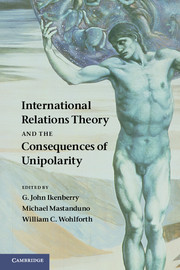Book contents
- Frontmatter
- Contents
- Figures
- Tables
- Notes on the contributors
- Notes on the editors
- 1 Introduction: unipolarity, state behavior, and systemic consequences
- 2 Unipolarity, status competition, and great power war
- 3 Legitimacy, hypocrisy, and the social structure of unipolarity: why being a unipole isn't all it's cracked up to be
- 4 Alliances in a unipolar world
- 5 System maker and privilege taker: US power and the international political economy
- 6 Free hand abroad, divide and rule at home
- 7 The liberal sources of American unipolarity
- 8 Unipolarity: a structural perspective
- 9 Unipolarity and nuclear weapons
- 10 From unipolarity to multipolarity: transition in sight?
- 11 Sell unipolarity? The future of an overvalued concept
- Index
- References
6 - Free hand abroad, divide and rule at home
Published online by Cambridge University Press: 05 June 2012
- Frontmatter
- Contents
- Figures
- Tables
- Notes on the contributors
- Notes on the editors
- 1 Introduction: unipolarity, state behavior, and systemic consequences
- 2 Unipolarity, status competition, and great power war
- 3 Legitimacy, hypocrisy, and the social structure of unipolarity: why being a unipole isn't all it's cracked up to be
- 4 Alliances in a unipolar world
- 5 System maker and privilege taker: US power and the international political economy
- 6 Free hand abroad, divide and rule at home
- 7 The liberal sources of American unipolarity
- 8 Unipolarity: a structural perspective
- 9 Unipolarity and nuclear weapons
- 10 From unipolarity to multipolarity: transition in sight?
- 11 Sell unipolarity? The future of an overvalued concept
- Index
- References
Summary
Why did America invade Iraq? The glib answer is “because it could.” In the unipolar moment the immediate costs and risks of using military force against Saddam Hussein's hollow, troublesome regime seemed low to US leaders.
But this explanation begs the important questions. Dispro-portionate power allows greater freedom of action, but it is consistent with a broad spectrum of policies, ranging from messianic attempts to impose a new world order to smug attempts to insulate oneself from the world's quagmires. How this freedom is used depends on how threats and opportunities are interpreted when viewed through the prism of ideology and domestic politics.
- Type
- Chapter
- Information
- Publisher: Cambridge University PressPrint publication year: 2011
References
- 2
- Cited by

